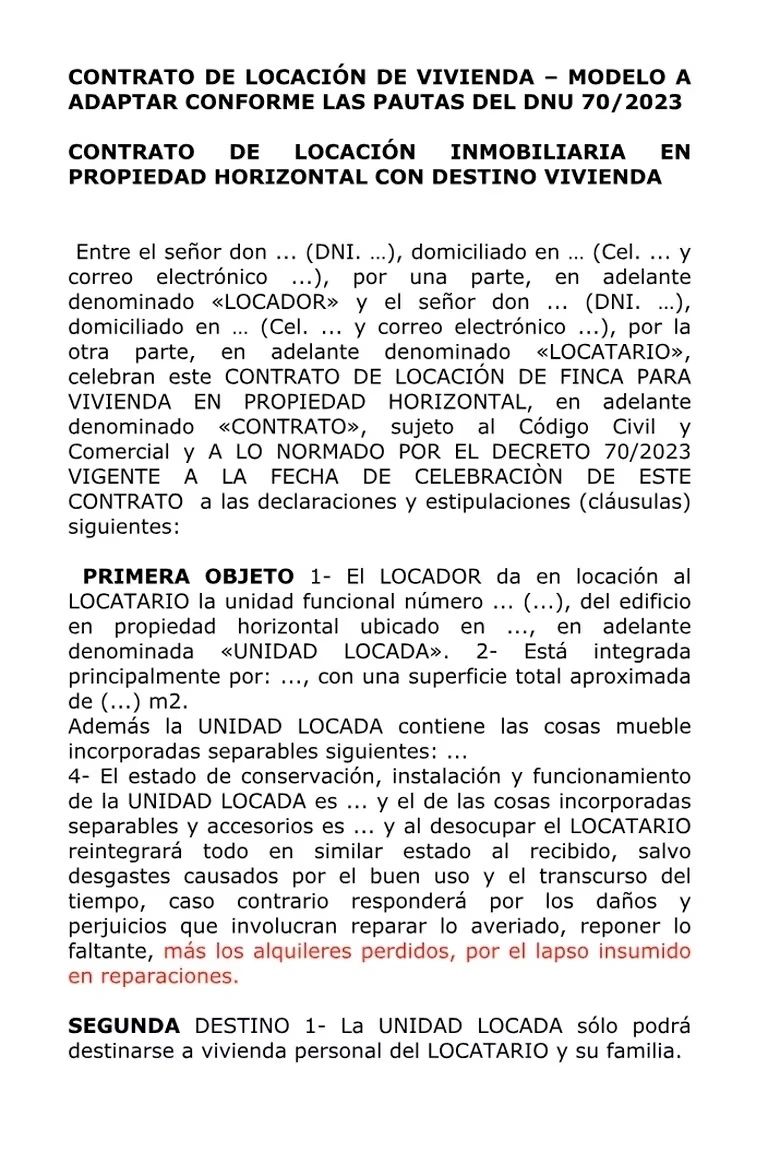BuySellBA
Administrator
New rental contracts: The details of how they are agreed and what terms and types of adjustments are being - Infobae

Source:

Nuevos contratos de alquileres: los detalles de cómo se pactan y qué plazos y tipos de ajuste se están usando
Tras la desregulación del mercado, luego del DNU que derogó la ley, cada acuerdo es único y propietarios e inquilinos puede acordar las condiciones
January 17, 2024
After the deregulation of the market, after the DNU that repealed the law, each agreement is unique and owners and tenants can agree on the conditions
By José Luis Cieri

New dynamics to sign deregulated rentals. Experts suggest leaving everything in writing to preserve a good contractual relationship between owners and tenants (Illustrative Image Infobae)
With the entry into force of the Decree of Necessity and Urgency (DNU) signed by President Javier Milei that repealed the Rental Law, the agreements returned under the terms stipulated by the Civil and Commercial Code (CCyC). However, it is important to highlight that those contracts signed before the entry into force of the DNU, under the regulations then in force, are not affected retroactively and must maintain the conditions under which they were signed until their conclusion, whether by natural term or rescission.
Nowadays and like never before, there is a wide range of options for the parties to reach agreements in contracts. This scenario generated an increase in uncertainty among tenants regarding the negotiation of contracts, since there is a possibility that each agreement will be considered “unique and unrepeatable” after deregulation.
Mostly agreements in pesos are advocated, although contracts in dollars are also advancing. Iván Ginevra , president of the Argentine Real Estate Chamber (CIA), highlighted to Infobae that “the ideal is freedom, for each owner and tenant to negotiate the contract according to their needs or personal preferences, advised of course by a trusted real estate agency always ”.
What predominates
According to the real estate agencies consulted, various agreements are being carried out with different terms, which range from one year to a maximum of two years.Alterations were made to the Civil and Commercial Code to provide “freedom of contract,” allowing owners and tenants to be free to enter into a contract and determine its content autonomously.
Diana Sevitz, of the CIA Training Institute (ICI), emphasized the importance of tenants carefully examining what they are going to sign. She recommended paying special attention if the owner requests a deposit in dollars or euros. Currently, contracts with quarterly or four-monthly adjustments through the Consumer Price Index (CPI) prevail. However, fixed-dollar contracts are also observed, since there is freedom in the forms. In this context, it is crucial to highlight that contracts are not uniform and that tenants must be prepared to adjust their expectations, as clauses can vary considerably from one landlord to another.”
Additionally, it is important to consider that each owner may have specific requirements. As for the tenant, it is essential to align expectations in terms of the duration of the contract, since, if not specified, it can vary, usually being one year in the case of residential use.
“It is essential to clarify whether any additional guarantee is required, such as a guarantor or other type of support. Likewise, the question of expenses arises, highlighting that the extraordinary ones are not the responsibility of the tenant (he only pays the ordinary ones). Another crucial point is the deposit, which can be requested in dollars, reflecting the current market trend. The possibility of indexing also comes into play, allowing the inclusion of the CPI or other adjustments. In this diverse scenario, attention to detail and adaptability are essential when negotiating and signing rental contracts,” said Sevitz.

Fragment of a rental model, but since the options are so diverse, they can be made with different clauses that are established by mutual agreement between owners and tenants with the intermediation of real estate agencies.
Main guidelines
The DNU introduced various reforms to the real estate leasing regime, including modifications to the early termination regime of rental contracts for housing (article 1221 of the CCyC).Following the modifications, the tenant is given the possibility of terminating the contract at any time. However, this action entails payment to the landlord of 10% of the future rent, that is, the unearned portion of the rent. To calculate this payment, the period between the date of notification of termination and the agreed end date of the contract must be taken into account.
Other clauses are the following:
Contract Term : Now, the term of housing rental contracts is agreed upon by the parties without a legal minimum. If the term is not specified in the contract, it will be two years.
Adjustment method: The parties can freely agree on the adjustment of the rental value using any index, public or private, in the same currency of the contract.
Enrique Abatti (h.) , lawyer specialized in real estate law and director of the Chamber of Property Owners of the Argentine Republic, pointed out that contracts are currently being formalized with terms of 2 years, subject to quarterly and quarterly adjustments according to the Consumer Price Index (IPC). “In addition, agreements in dollars in those areas where rents were already linked to the value of said currency, as is the case of Puerto Madero, Avenida Libertador corridor, and several gated communities and countries. Rental values are dictated by market dynamics, and it is challenging to determine whether they experienced a slowdown, especially considering the significant increase in prices at a general level recorded last December,” he said.
Specialists suggest the formalization of contracts with a maximum duration of 2 years, since the uncertainty about the economic outlook in the coming months hinders the ability of the parties to maintain a balanced contract in the midst of such volatile economic conditions.
Tenants are conducting negotiations based on their current ability to pay. The demand for apartments is high, and the key word is negotiation. Temporary rentals, which used to be hidden contracts due to old legislation, are today preferred with guarantees and with people who reside in the country and are committed to taking care of the apartment, assuming responsibility for expenses.
Oscar Puebla, architect and Real Estate expert, highlighted the importance of eliminating the CPI in negotiations, since it is not related to the rental real estate market. “Instead, he suggested a 35% quarterly adjustment and agreeing the rental value annually, taking into account market conditions. Some landlords demand disproportionate amounts, which affects your ability to rent. With the gradual entry of more supply, room for negotiation opens up. In the current situation, tenants are finding ways to accommodate, and I recommend landlords rent now, as prices are likely to be more affordable in March,” he stated.
Frequency of Adjustments : Freedom is granted to determine how often the contract will be updated, eliminating the previous semiannual minimum.
Do not register it with the AFIP : It is no longer necessary to register rental contracts with the Federal Public Revenue Administration (AFIP).

Depending on the case, in permanent housing contracts, the 2-year term seems to be the one that provides security to both parties. However, there may be particular cases of months, 1 year or even shorter periods (Photo: Pexels)
Balance
Specialists highlight the importance of establishing equitable contracts that benefit both parties. They point out that imposing adjustments below inflation was one of the causes of the failure of the now repealed law, but they also warn about the inadmissibility of using methods that are unpayable for the tenant.Diego Migliorisi , from Migliorisi Inmobiliaria, proposes considering variations based on reasonable indicators such as the CPI, the tenant's salary or a specific product.
“The key lies in consistency in compliance and willingness to pay, as well as the commitment to renew using the same methods. Regarding the choice of indices, owners seek to protect themselves by setting initial prices against updates allowed before 12/29/23, using the Casa Propia index, which is lower than inflation. However, he highlights that the panorama has changed and suggests choosing a more reasonable index and a shorter update, which would not only impact the owner less but could also result in more attractive initial prices, taking into account the competitiveness of the market," Migliorisi noted.
Today the trend is basically to return to the modality before 2020 and with terms of two years at most.
Andrea Borges Do Canto , executive director of Alianza Urbana and Landium Real Estate, highlighted that “the role of the real estate agency is resignified and is key in these scenarios of changes in the rules of the game, the focus must be on reaching an agreement in that the interests of the parties are taken care of and aligned since the conditions are agreed freely and by mutual agreement.”
And he listed several points to take into account when signing contracts:
Currency and Payment Method: Clearly establish the currency and payment method, defining the conditions to avoid misunderstandings.
Advance Payments: Whether or not to accept the possibility of advance payments, enabling the owner to demand them, is crucial and must be mutually agreed upon.
Guarantees and Deposits: Define how deposits are returned and updated, even considering dollar amounts beyond the contract currency.
Condition of the Property and Renovations: It is advisable to establish in advance the state of conservation of the property post contract, promoting a transparent relationship.
Use of the Property and Pets: Explain in the contract the conditions regarding the use of the property and the presence of pets.
Insurance: Define the contracting of policies, determine who pays for public services and establish civil liability for damages to third parties, ensuring clarity in the management of the property.
Regarding the starting point of the price, Do Canto concluded: “We have observed that the market is self-regulating by supply and demand. Currently, the key factor in negotiations to reduce the price is linked to the advance payment of the contract in most cases. This condition provides peace of mind and reduces the uncertainty generated during these first weeks after the change of government.”
www.buysellba.com

